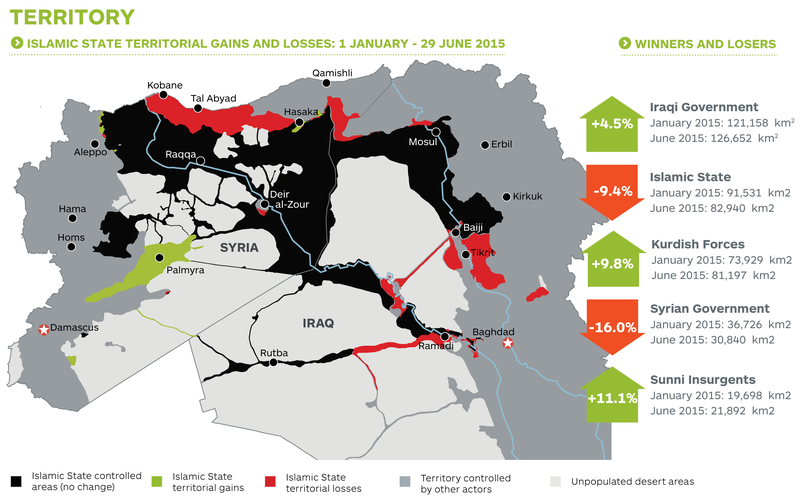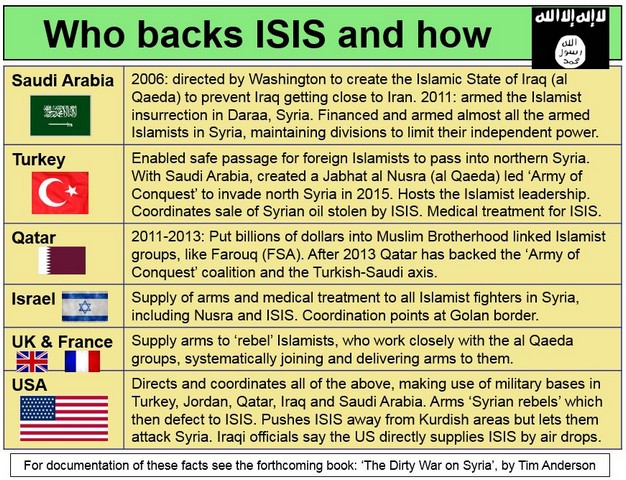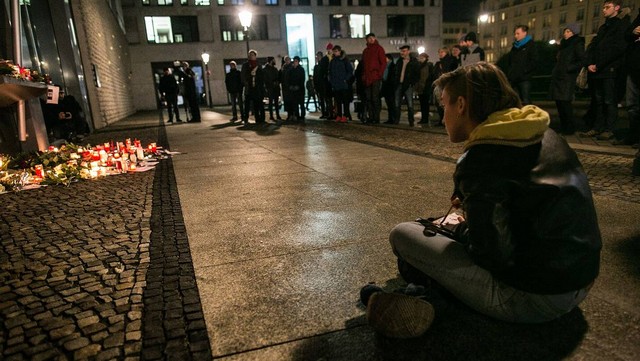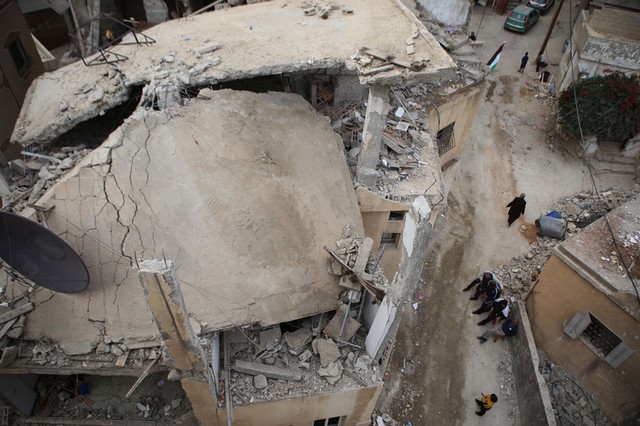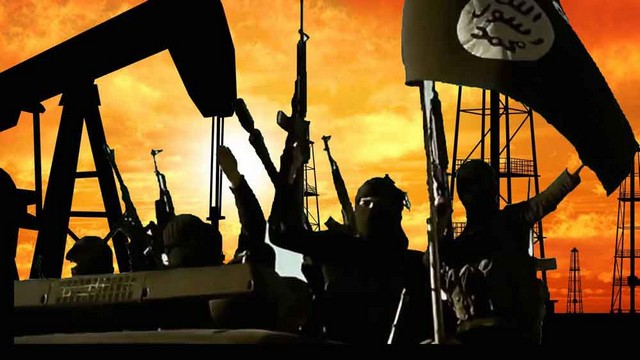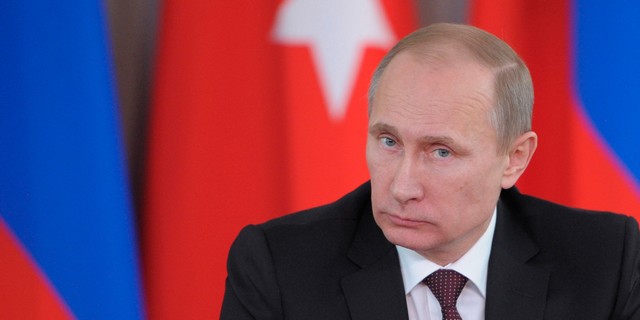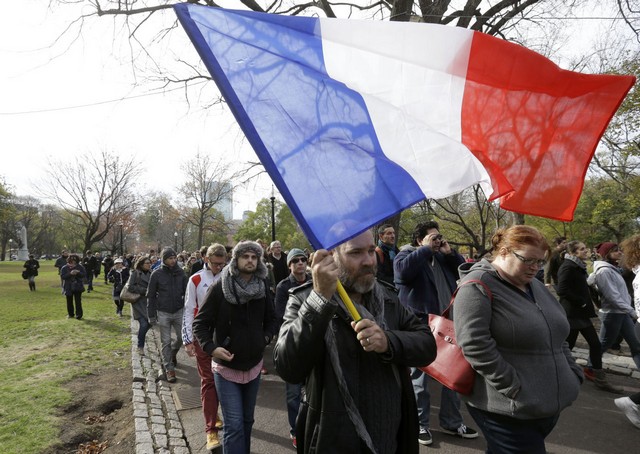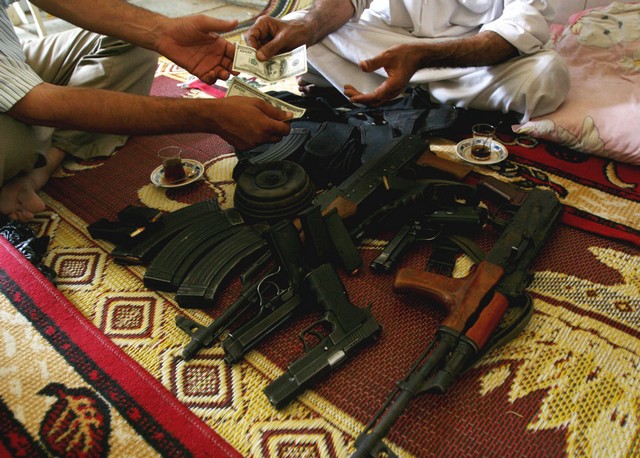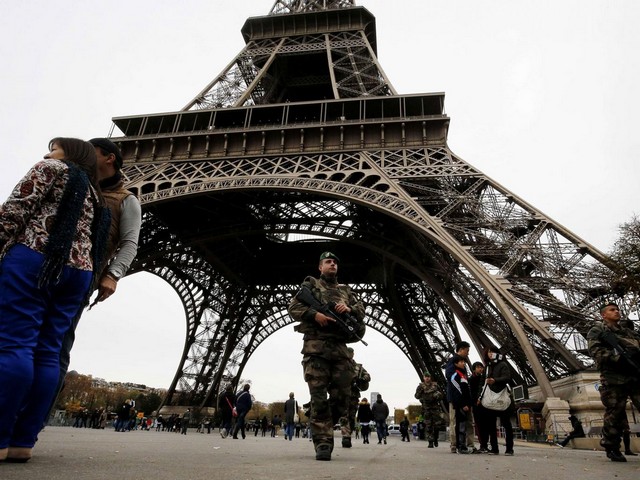By Dr Gideon Polya
The appalling Paris atrocity – about 130 innocent civilians killed and 300 wounded – must be unequivocally condemned as utterly barbaric by all decent people throughout the world but also demands honest appraisal as evident “blowback” for the role of France under serial war criminal President Francois Hollande in the Neocon American and Zionist Imperialist (NAZI) –promoted US War on Muslims (13 million Muslim deaths from violence or war-imposed deprivation since 1990). In the 21st century a US lackey, nuclear terrorist, New Vichy France has attacked or otherwise sent military forces to 13 substantially Muslim countries and is major backer of nuclear terrorist Apartheid Israel.
The reality of France’s role in the ongoing, post-1990 US War on Muslims was incisively exposed at the time of the French invasion of Mali in 2013 when outstanding anti-racist Jewish American human rights activist, lawyer, author, investigative journalist and critic of western imperialism, Apartheid Israel and the US surveillance state, Glenn Greenwald, writing in the UK Guardian, stated: “As French war planes bomb Mali, there is one simple statistic that provides the key context: this west African nation of 15 million people is the eighth country in which western powers – over the last four years alone – have bombed and killed Muslims – after Iraq, Afghanistan, Pakistan, Yemen, Libya, Somalia and the Philippines (that does not count the numerous lethal tyrannies propped up by the west in that region). For obvious reasons, the rhetoric that the west is not at war with the Islamic world grows increasingly hollow with each new expansion of this militarism. But within this new massive bombing campaign, one finds most of the vital lessons about western intervention that, typically, are steadfastly ignored” [1].
In January 2014 it was estimated that France had invaded about 80 countries since the time of Charlemagne, but that listing (now 82) requires an updating to more precisely include war criminal French military activities in 14 countries (13 substantially Muslim) in the 21st century under President Francois Hollande and his predecessor President Nicolas Sarkozy.
These 21st century 14 national victims of French state terrorism are highlighted in bold below in the list of 82 countries invaded by France together with the approximate dates for the entry of French forces [2]:
Western Europe – Austria (1805, 1809, 1945), Belgium (9th- 12th century, 15th -18th century, 1797), France (Albigensian Crusade or Cathar Crusade, 1209-1229; Huguenot Massacres, 1572; French Revolution Reign of Terror, 1793-1794; Vichy French Jewish Genocide, 1941-1945), Germany (6th century, 800-814, 1812, 1919, 1945), Italy (800-814, 16th – 18th century, 1796-1815), Luxembourg (1797, 1866), Malta (1798), Netherlands (9th century, 14th – 15th century, 17th -18th century, 1672, 1794), Portugal (17th -18th century, 1807), Spain (18th century, 1808), Switzerland (9th-16th century, 1515), Britain (UK) (1066; Hundred Years War, 1337-1437).
Eastern Europe – Belarus (1812), Hungary (1919), Lithuania (1812), Poland (1807, 1812), Russia (1812, 1918-1920).
Non-Arab Africa – Benin (17th – 19th century slavery , 1863, 1891-1894, 1904, 1977), Burkina Faso (1805-1894, 2013), Cameroon (1916, 1919, 1946), Central African Republic (1897, 1979, 1997, 2013), Chad (1890, 1894, 1960, 1972, 1975, 2013), Comoros (1843, 1978), Congo (Brazzaville) (16th – 19th century slavery, 1880, 1880s-1930s, genocide by French), Congo (Zaire) (1960s -21st century, French peace keepers), Côte D’Ivoire (15th – 19th century slavery, 1842; 2002), Djibouti (1862, 1975 onwards), Equatorial Guinea (15th – 19th century slavery, 1900), Gabon (15th – 19th century slavery, 1885, 1964), Gambia (15th – 19th century slavery, 1867, 1981), Guinea (15th – 19th century slavery, 1849, 1886), Liberia ( 15th – 19th century slavery), Madagascar (1642, 1883, Mali (19th century, 1850, 2013), Mauritania (1858, 1903, 1920, 2013), Mauritius (1715-1810), Niger (1885, 1890s, 1922, 1946, 2013), Réunion (1638), Sao Tomé and Principe (15th – 19th century slavery), Senegal (1638, 1639, 1677, 1775-1783, 1854-1885) , Seychelles (1756), Sierra Leone (15th – 19th century slavery), Somalia (1862, 2009, 2013), Togo (16th – 19th century slavery, 1897, 1912-1918, 1992, 1946), Western Sahara (20th century, 1904).
North America – Canada (1534), United States (17th century).
Latin America – Dominica (16th century), Dominican Republic (1697, 1795), French Guiana (1604), Grenada (1674), Guadeloupe (16th century), Haiti (1697, 1801, 2004), Martinique (1635), Mexico (1861), Monserrat (16th century), Puerto Rico (16th century), Saint Lucia (1660), Turks and Caicos (17th century, 1764).
North Africa and Middle East – Algeria (1820s), Egypt (1798, 1956), Iraq (1991, 2014), Lebanon (11th – 13th century Crusades, 1861, 1916, 1919), Libya (1815, 1940 with UK , 2011), Morocco (1854), Palestine (11th – 13th century Crusades), Syria (11th – 13th century Crusades, 1916, 1920, 1941, 1945, 2014), Tunisia (1881, 1945).
Turkey , Central Asia – Afghanistan (2001), Turkey (1915).
South Asia – Bangladesh (16th -18th century), India (16th -18th century).
South East Asia – Cambodia (1854, 1863, 1945), Laos (1893, 1945), Vietnam (1860, 1945).
East Asia – China (1856), Korea (1950).
Pacific – French Polynesia (1840), New Caledonia (1853), New Zealand (Greenpeace Rainbow Warrior bombing, 1985), Vanuatu (19th century).
To reiterate, France in the 21st century has invaded or otherwise had military forces in 14 countries of which all but Haiti had substantial Muslim populations. Under serial war criminal President Francois Hollande, France is currently involved militarily in 11 substantially Muslim countries (and one supposes also reserves a France-UK-US (FUKUS) Alliance “right” to continue to bomb targets in Libya, a “right” currently being exercised by the US). This list does not include an uncertain number of countries in which France is involved in clandestinely, in military training or in arms dealing.
Military invasion, bombing, and military-backed neo-colonial hegemony will result in not only deaths from violence but also in avoidable deaths from war- or hegemony-imposed deprivation as analyzed in my book “Body Count. Global avoidable mortality since 1950” [3]. Avoidable death, avoidable mortality, excess death, excess mortality, premature death, untimely death, death that should not have happened) is the difference between the observed deaths in a country and the deaths expected for a peaceful, decently governed country with the same demographics (i.e. the same birth rate and age distribution) [3]. Thus 1.3 billion people have died avoidably in the period 1950-2005, 1.2 million in the Developing World and 0.6 million in the Muslim World, a Muslim Holocaust and Muslim Genocide 100 times greater than the WW2 Jewish Holocaust (5-6 million killed) or the “forgotten” WW2 Bengali Holocaust in which the British with Australian complicity deliberately starved 6-7 million Indians to death for strategic reasons (genocidally racist White Australia was complicit by withholding food from starving Indian from its huge wartime grain stores) [4-7].
As summarized below, over 142 million people have died avoidably from deprivation since 1950 in countries occupied by France in the post-WW2 era. The most justifiably much-admired beauty and elegance of Paris, France, French high culture and French haute couture have come at an enormous price for Developing countries and Muslim countries in particular.
The following summary data is of post-1950 avoidable mortality/ 2005 population (both in millions, m) and expressed as a percentage (%) for France, for each country occupied by France in the post-1945 era, and as a total for all the countries subject to French occupation in that period. The asterisk (*) indicates a major occupation by more than one country in the post-WW2 era: France [3.275m/60.711m = 5.4%] – Algeria [7.167m/32.877m =21.8%], Benin [3.267m/7.103m = 46.0%], Burkina Faso [6.810m/13.798m = 49.4%], Cambodia* [5.852m/14.825m = 39.5%], Cameroon* [6.669m/16.564m = 40.3%], Central African Republic [2.274m/3.962m =57.4%], Chad [5.085m/9.117m = 55.8%], Comoros [0.204m/0.812m =25.1%], Congo (Brazzaville) [1.085m/3.921m = 27.7%], Côte d’Ivoire [6.953m/17.165m = 40.5%], Djibouti [0.265m/0.721m = 36.8%], Egypt* [19.818m/74.878m = 26.5%], French Guiana [0.010m/0.187m = 5.3%], French Polynesia [0.018m/0.252m = 7.1%], Gabon [0.504m/1.375m = 36.7%], Guadeloupe [0.025m/0.446m = 5.6%], Guinea [5.185m/8.788m = 59.0%], Haiti* [4.089m/8.549m = 47.9%], Laos* [2.653m/5.918m = 44.8%], Madagascar [7.098m/18.409m = 38.6%], Mali [6.808m/13.829m = 49.2%], Martinique [0.022m/0.397m = 5.5%], Mauritania [1.294m/3.069m = 42.2%], Mauritius [0.064m/1.244m = 5.18], Morocco* [8.202m/31.564m = 26.0%], New Caledonia [0.017m/0.237m = 7.2%], Niger [6.558m/12.873m = 50.9%], Réunion [0.047m/0.777m = 6.0%], Senegal [4.457m/9.393m = 47.5%], Syria* [2.198m/18.650m = 11.8%], Togo [1.950m/5.129m = 38.0%], Tunisia [1.582m/10.042m =15.8%], Vanuatu* [0.037m/0.222m = 16.7%], Vietnam* [24.015m/83.585m = 28.7%], Total = 142.291m/430.678m = 33.0% [3].
The 21st century French military involvements from Haiti to Afghanistan are summarized below with countries in alphabetical order together with data on (a) current population, (b) 1950-2005 avoidable deaths from deprivation [3], (c) current annual avoidable deaths in 2015 from deprivation, and (d) annual per capita GDP (noting that the annual per capita GDP for rich, peaceful and independent France is $41,000):
Afghanistan [32.5 million; (b) 16.6 million; (c) 149,000; (d) $1,900]. Remote Afghanistan has been repeatedly invaded by the British (19th century), the Russians (1979) and thence by the US Alliance including France (2001). 2,000 French combat troops were withdrawn from Afghanistan in 2012 leaving 1,400 for training and logistics. The continuing US Alliance Afghan War (6 million Afghan deaths from violence or war-imposed deprivation) [8, 9] was ostensibly about the presence in Afghanistan of Al Qaeda and Osama bin Laden and their supposed responsibility for 9-11, an atrocity that numerous science, engineering, architecture, aviation, military and intelligence experts say was a US Government false flag operation, with some asserting Israeli involvement [10]. However Al Jazeera reported a recent interview with former Afghan President Hamid Karzai thus (2015): “On the 14th anniversary of the 9/11 attacks, Afghan President Hamid Karzai joins Mehdi Hasan in UpFront’s Headliner segment. In this online preview, Karzai dismisses al-Qaeda’s presence in the country, calling it a “myth”. “[Al-Qaeda] is for me a myth … For us, they don’t exist.” “I don’t know if al-Qaeda existed and I don’t know if they exist,” said Karzai. “I have not seen them and I’ve not had any report about them, any report that would indicate that al-Qaeda is operating in Afghanistan.” Asked whether he believed Osama bin Laden carried out the 9/11 attacks in New York and Washington DC and plotted them from Afghanistan, he responded: “That is what I have heard from our Western friends. That’s what the Western media says. There is no doubt that an operation, a terrorist operation was conducted in New York and in Washington.” Asked again by Hasan if he believed the 9/11 attacks were the responsibility of al-Qaeda in Afghanistan, the former president responded: “I neither believe nor disbelieve something that I don’t know about. I can tell you that Afghanistan was as much a victim of terrorism as was America, as were the people who were killed in the September 11th terrorist attacks” [11]. The horrendous death toll in Afghanistan (6 million Afghan deaths from violence or war-imposed deprivation since 2001) indicate the appropriateness of the terms Afghan Holocaust and Afghan Genocide to describe the France-complicit US Afghan War [8, 9]. However one cannot ignore collateral damage from French-complicit Afghan genocide – 1 million people have died from opiate related causes globally due to the US Alliance restoration of the Taliban-destroyed Afghan opium industry from 6% of world market share in 2001 to 93% in 2007, the breakdown (as of 2015) including 280,000 Americans, 256,000 Indonesians, 68,000 Iranians, 25,000 British, 14,000 Canadians, 10,000 Germans, 5,000 Australians and 500 French [8].
Burkina Faso [(a) 18.1 million; (b) 6.8 million; (c) 109,000; (d) $1,700]. Burkina Faso was brutally colonized by the French in the period 1805-1894 [3, 12] and gained nominal independence in 1960 from France, which nevertheless retained neocolonial hegemony. French forces returned in 2013 as part of Operation Burkhane directed against Muslim rebels in the Sahel [13].
Central African Republic [(a) 4.9 million; (b) 2.3 million; (c) 55,000; (d) $600]. The Central African Republic was colonized brutally by France in the late 19th century and gained nominal independence in 1960 from France, which nevertheless retained neocolonial hegemony [3]. In the post-2013 Central African Republic (CAR) civil war after Seleka rebels led by Djotodia (a Muslim) seized the capital, Bangui, Christian and animist anti-balaka forces have targeted Muslims. 6,000 people have been killed, nearly all of the 436 mosques in the country have been destroyed, and Muslims are being targeted for forced conversion or expulsion. The UN reports that that 2.7 million people are in need of aid, and 1.5 million people were affected by food insecurity. The UNHCR reports that 0.5 million people out of a population of about 5 million have been displaced and 0.4 million have fled to neighbouring states [14, 15]. According to the Guardian: “France ordered the deployment of 1,200 additional soldiers, following a call for help from the interim government and a UN security council resolution. They joined 3,500 soldiers from a central African support mission. At the start of 2014, a quarter of the country’s entire population was internally displaced. International pressure forced [Muslim Seleka leader] Djotodia to step down, and soon the Séléka were retreating north, where they continued to target Christians. But as the anti-balaka made inroads elsewhere, villages emptied of their Muslim populations, with homes looted and mosques torched. In the capital, Bangui, the Muslim population dropped from up to 145,000 to just 900. Amnesty International called it ethnic cleansing and warned of a Muslim exodus of historic proportions. Many Muslims were left feeling resentful towards French peacekeepers and the new president, Catherine Samba-Panza, a Christian who studied in France and has two of her three children living there” [16].
Chad [(a) 14.0 million; (b) 5.1 million; (c) 147,000; (d) $2,600]. Chad was brutally colonized by France in the 1890s and gained nominal independence in 1960 from France, which nevertheless retained neocolonial hegemony [3] . French forces repeatedly intervened from the 1980s onwards against northern Muslim rebels. French forces returned in force in 2013 as part of Operation Burkhane directed against Muslim rebels in the Sahel [13].
Côte D’Ivoire [(a) 20.1 million; (b) 7.0 million; (c) 199,000; (d) $3,100]. Côte D’Ivoire was ravaged by French, British and Portuguese slave traders in the 15th – 19th centuries, was brutally colonized by the French in the period 1842-1944, and finally regained independence in 1960 but with brutal French repression of the socialist independence movement. The French re-invaded in 2002 and French forces have remained ever since [3], with the French now reinforcing their base at the capital, Abidjan, as a key part of their military and economic control over the region [13].
Djibouti [(a) 0.9 million; (b) 141,000; (c) 8,000; (d) $3,100]. Djibouti was seized by France in the 1860s but gained nominal independence in 1977 with a major, continuing French , US and British presence. Djibouti was the base for French participation in the 1990-1991 Gulf War. The French were involved in suppressing Affar rebellion in the period 1977-2002. In 2003 the French lackey government sought the expulsion of 0.1 million Ethiopians and Somalis [3]. France gave the former French Foreign Legion Camp Lemonnier to the government of Djibouti, which then leased it to the US in 2001. France maintains over 1,500 troops in Djibouti and French forces in Djibouti have taken part in operations in Somalia, the Democratic Republic of Congo, and the Côte D’Ivoire [13].
Haiti [(a) 10.7 million; (b) 4.1 million; (c) 52,000, (d) $1,800]. Haiti was acquired by France in 1697 and was used for a slave-based plantation economy. A slave rebellion in 1789 led to British invasion in 1793. In 1804 an independent Haiti was declared but the new state was subject to repeated US intervention and invasion, culminating in decades of brutal rule in the 20th century by “Papa Doc” Duvalier. A democratically-elected Haitian Government under President Aristide was terminated in 2004 and Aristide was kidnapped and removed to Africa by the US. US lackey French forces were brought in as “peace keepers” but were later replaced by US lackey Latin American forces.
Iraq [(a) 36.4 million; (b) 5.3 million; (c) 47,000; (d) $15,300]. Iraq was invaded by the UK in 2014. The UK continued to repress Iraqi rebellion in Iraq up to and including WW2, notwithstanding ostensible Iraqi independence in 1932. France was involved in the Gulf War (1990-1991) in which 0.2 million Iraqis were killed and in the war criminal 1990-2003 Sanctions in which Iraqi deaths from imposed deprivation totalled 1.7 million. France was not directly involved in the 2003-2011 US Alliance Iraq War in which 2.7 million Iraqis died from violence (1.5 million) or from war-imposed deprivation (1.2 million). France became involved in US Alliance bombing of Iraq in 2014, intervention that may prolong war and civil war in Iraq for decades more. The Iraqi Holocaust and Iraqi Genocide has, so far, been associated with 1.7 million violent deaths, 2.9 million avoidable deaths from war-imposed deprivation, 5-6 million refugees and 2 million under-5 infant deaths (90% avoidable and due to horrendous US Alliance war crimes in gross violation of the Geneva Convention) [9, 17].
Libya [(a) 6.3 million; (b) 0.8 million; (c) 8,000; (d) $15,900]. France was involved with the UK in attacking Libya in 1815. Libya was brutally occupied by Italy in the period 1911-1943 but was “liberated” and ruled by the UK and France until UN administration in 1949 and independence in 1951. Under Muammar Gaddafi (1969-2011) Libya became the most prosperous country in all of Africa. The 2011 France-UK-US (FUKUS) Alliance bombing campaign removed Gaddafi, splintered the country, killed 100,000 people and generated 1 million refugees. From zero annual avoidable deaths under Gaddafi, UN demographic data now indicate 8,000 avoidable deaths annually in a devastated Libya. The US continues to bomb Libya.
Mali [(a) 20.1 million; (b) 7.0 million; (c) 199,000; (d) $1,700]. Mali was brutally subdued by the French in the 19th century but secured independence in 1960. In 2013, France launched airstrikes against Tuareg rebels who had conquered the northern half of the country and finally defeated them in a so-called Operation Serval. France followed up Operation Serval with Operation Barkhane dedicated to killing Muslim rebels in the Sahel countries of Mali, Mauritania, Burkina Faso, Niger and Chad.
Mauritania [(a) 17.6 million; (b) 1.3 million; (c) 123,000; (d) $4,300]. In the 14th and 15th centuries Mauritania was part of the Mali Empire but was increasingly subject to European (Portuguese, English, Dutch and French) incursion, In the 19th century the French invaded to consolidate French territory from Senegal to the Sudan. Mauritanian resistance was only finally overcome in the 1930s. Mauritania became formally independent in 1960 but was subject to French hegemony and interference. France’s Operation Barkhane involves thousands of air-supported French troops dedicated to killing Muslim rebels in the Sahel countries of Mali, Mauritania, Burkina Faso, Niger and Chad.
Niger [(a) 19.9 million; (b) 6.6 million; (c) 111,000. (d) $1,100]. In the 17th century Niger was part of the Songhai Empire based on the River Niger. Niger was conquered by France in the late 19th century but became ostensibly independent in 1960 but under French hegemony. The French Operation Barkhane involves thousand of air-supported French troops dedicated to killing Muslim rebels in the Sahel countries of Mali, Mauritania, Burkina Faso, Niger and Chad.
Somalia [(a) 10,8 million; (b) 5.6 million; (c) 91,000. (d) $600]. Somalia was repeatedly invaded by Italy in the 19th century and the 20th century. The British took over Somalia in WW2. Independence in 1960 was followed by war against Ethiopia and civil war, the effects of which were exacerbated by drought and famine. The US invaded in 1992 and after extensive civil war an Islamic administration assumed power in 2005. However the US backed an Ethiopian invasion in 2007 and thence a Kenyan invasion. In 2009 France and Germany invaded Somali waters to retake a French yacht which had been captured by Somali pirates. In 2013 French special forces from Djibouti failed in an operation to rescue French intelligence agent from Indigenous Somali al-Shabaab forces in the town of Buulo Mareer.
Syria [18.5 million; (b) 2.2 million; (c) 30,000; (d) $5,100]. French crusaders invaded Syria in the 11th and 12th centuries. Notwithstanding Arab participation in the British defeat of the Turks in WW2, secret deception by the Allies via the 1916 Anglo-French Sykes-Picot Agreement divided the Middle East between Britain and France. In 1920 Syria was put under a League of Nations mandate to France. In 1925 there was a Druze rebellion and the French bombarded Damascus. In 1926 Lebanon was separated from Syria by France and in 1936 Syria was granted autonomy. In 1941 British and Free French forces invaded to defeat pro-Nazi Vichy French forces. In 1944 Syria became independent and in 1945 Syria became a founding member of the UN. The last French forces left Syria in 1946. However French diplomatic, military, financial and nuclear assistance to Apartheid Israel ultimately enabled Apartheid Israel to occupy and largely ethnically cleanse the Golan Heights part of Syria in 1967 and to regularly bomb Syria with impunity since then. France (together with Turkey, the US, UK, Saudi Arabia and Qatar) has materially and diplomatically backed anti-Assad rebels in Syria since about 2011 and only a Russia/China veto at the UN Security Council prevented a France-UK-US (FUKUS) Alliance repeat in Syria of what FUKUS did to Libya. Assad’s Syria barely survives as a rare secular state in the Muslim world with Russian and Iranian support whereas US policy has destroyed secular regimes elsewhere in the Muslim world, notably in Afghanistan (1978), Iran ( 1953), Iraq (2003) and Libya (2011)[18]. Assad commenting after the Paris atrocity: “[France’s] mistaken policies… have contributed to the spread of terrorism… France has got to know what we live with in Syria…[ President Francois Hollande] should change his policy…The question that is being asked throughout France today is, was France’s policy over the past five years the right one? The answer is no” [19]. Indeed on 12 November 2012, precisely 3 years before the Paris attack, France became the first Western power to officially recognise Syria’s opposition coalition as the sole legitimate representative of the Syrian people [20]. The Syrian Civil War has so far killed about 0.3 million people violently, possibly killed about 0.3 million people through war-imposed deprivation, and generated about 12 million refugees. Syria was once a haven of religious toleration [21] and a world leader per capita in providing haven for refugees, but has now been devastated in a France-, UK-, US- and Apartheid Israel-backed sectarian civil war and half of its population are now refugees themselves.
France has invaded about 82 countries (as compared to the UK 193, Australia 95, the US 70, the US 70, Germany 38, Japan 30, Russia 24, Canada 24, Apartheid Israel 12 and China 2) [2, 22-24 ], testament to an entrenched culture of French hubris, French imperialism, French racism and French state terrorism. Many throughout the world are quite rightly appalled by the Paris atrocity but ignore or excuse the continuing, horrendous record of French invasions of other countries, French state terrorism and war crimes such as those for which Nazi German generals were hanged after 1945.
Indeed the ongoing war criminal French invasion of other countries in the 21st century is regarded by many in the Orwellian, Zionist-perverted US Alliance Murdochracies, Lobbyocracies and Corporatocracies as “peace keeping” or “responsibility to protect” (”R2P”) i.e. these egregious war crimes are not considered to be crimes at all but are regarded as noble humanitarian endeavours. This Mainstream media whitewashing of French war crimes reminds one of the words of great French playwright Molière (Jean-Baptiste Poquelin) in “Tartuffe ou L’Imposteur” (“Tartuffe or the Hypocrite”): “Le scandale du monde est ce que fait l’offence, Et ce n’est pas pécher que pécher en silence (It is public scandal that constitutes offence, and to sin in secret is not to sin at all)” [3].
People are rightly appalled by the Paris atrocities perpetrated against hundreds of unarmed and innocent civilians but ignore the Elephant in the Room reality that since the defeat of Napoleon by the Russians and thence by the British and Germans at Waterloo, the French have mostly directed their military prowess against effectively unarmed and impoverished people in the Americas (Mexico, Guiana and Haiti) , the northern half of Africa, the Middle East, South East Asia, East Asia (China) and the Pacific. Almost none of these victim countries have ever invaded other countries and then only with contiguous, neighbouring countries [3]. Indeed of the 14 countries bombed or occupied by France in the 21st century, only Iraq and Libya had invaded a neighbour (UK-created Kuwait and Chad, respectively). The annual per capita GDP of France’s 14 impoverished 21st century victims range from $600 (Central African Republic and Somalia) to $15,300 and $15,900 for oil-rich Iraq and Libya, respectively, as compared to $41,000 for serial-invader and Syrian terrorism-supporting France, $54,000 for serial invader and Syrian terrorism-supporting US, $137,000 for Syrian terrorism–supporting and Yemen-invading Qatar and $52,000 for Syrian terrorism-supporting and Yemen-invading Saudi Arabia [25].
Conclusions.
Decent people around the world will unreservedly condemn the appalling Paris atrocity involving about 130 innocent and unarmed civilians killed and 300 wounded. However this atrocity is evident “blowback” for the role of France under serial war criminal Presidents Nicolas Sarkozy and Francois Hollande in the Neocon American and Zionist Imperialist (NAZI)–promoted US War on Muslims that amounts to a Muslim Holocaust and a Muslim Genocide (13 million Muslim deaths from violence or war-imposed deprivation since 1990). Indeed ISIS has claimed responsibility for this atrocity, citing the French military involvement in Syria.
In the 21st century a US lackey, nuclear terrorist, New Vichy France has attacked or otherwise sent military forces to 13 substantially Muslim countries and is major backer of nuclear terrorist Apartheid Israel that is responsible for an ongoing Palestinian Genocide ( 2 million Palestinian deaths since 1936 from violence, 0.1 million, or from violently-imposed deprivation, 1.9 million [26]).
Decent people must wonder what they can do in the face of appalling non-state terrorism as exhibited by ISIS in this latest Paris atrocity and the vastly worse carnage wrought by French state terrorism, US state terrorism, UK state terrorism and Apartheid Israeli state terrorism in the Muslim world. Peace is the only way but silence kills and silence is complicity. Decent people who are utterly opposed to both non-state terrorism and state terrorism must (a) inform everyone they can, (b) urge and support urgent cease-fire, dialogue and compromise between all parties to prevent a worsening catastrophe in both Iraq and Syria, and (c) urge and apply Boycotts, Divestment and Sanctions (BDS) against all people, parties, politicians, companies, corporations and countries disproportionately involved in militarism, violence, war, non-state terrorism and state terrorism.
Unfortunately in New Vichy France under serial war criminal Hollande, (a) there is a massive media ignoring, as in the rest of the Neocon American and Zionist Imperialist (NAZI)–dominated West, of the horrendous realities of US Alliance state terrorism, (b) the rational course of urgent cease-fire, dialogue and compromise is dismissed in favour of endless high technology extermination, and (c) a recent French court ruling makes it now effectively illegal in France for pro-peace and pro-human rights activists to advocate Boycotts, Divestment and Sanctions (BDS) against neo-Nazi apartheid states like Apartheid Israel and their racist supporters [27]. Decent French people must respond to the appalling Paris atrocity by recognizing the racist and murderous evil of state terrorism and its propensity to excite murderous non-state terrorism – they must get rid of Hollande and his ilk at the ballot box.
References.
[1]. Glenn Greenwald, “The bombing of Mali highlights all the lessons of western intervention”, Guardian, 15 January 2013: http://www.theguardian.com/commentisfree/2013/jan/14/mali-france-bombing-intervention-libya .
[2]. Gideon Polya, “President Hollande And French Invasion Of Privacy Versus French Invasion Of 80 Countries Since 800 AD”, Countercurrents, 15 January, 2014: http://www.countercurrents.org/polya150114.htm .
[3]. Gideon Polya, “Body Count. Global avoidable mortality since 1950”, that includes an avoidable mortality-related history of every country since Neolithic times and is now available for free perusal on he web: http://globalbodycount.blogspot.com.au/2012/01/body-count-global-avoidable-mortality_05.html .
[4]. “Bengali Holocaust (WW2 Bengal Famine) writings of Gideon Polya”, Gideon Polya Writing: https://sites.google.com/site/drgideonpolya/bengali-holocaust .
[5]. Gideon Polya (1998), “Jane Austen and the Black Hole of British History. Colonial rapacity, holocaust denial and the crisis in biological sustainability”, 2008 edition that is now available for free perusal on the web: http://janeaustenand.blogspot.com/ .
[6]. Gideon Polya (1995) ” The Forgotten Holocaust – The 1943/44 Bengal Famine”: http://globalavoidablemortality.blogspot.com.au/2005/07/forgotten-holocaust-194344-bengal.html .
[7]. Gideon Polya (2011), “Australia And Britain Killed 6-7 Million Indians In WW2 Bengal Famine”, Countercurrents, 29 September, 2011: http://www.countercurrents.org/polya290911.htm .
[8]. “Afghan Holocaust Afghan Genocide”: https://sites.google.com/site/afghanholocaustafghangenocide/ .
[9]. “Muslim Holocaust Muslim Genocide”: https://sites.google.com/site/muslimholocaustmuslimgenocide/ .
[10]. “Experts: US did 9-11”: https://sites.google.com/site/expertsusdid911/ .
[11]. “Preview: Hamid Karzai says al-Qaeda is a “myth’”, Al Jazeera, 10 September 2015: http://www.aljazeera.com/programmes/upfront/2015/09/preview-hamid-karzai-al-qaeda-myth-150910101842572.html?utm_source=Sailthru&utm_medium=email&utm_campaign=New%20Campaign&utm_term=*AfPak%20Daily%20Brief ).
[12]. Sven Lindqvist, “Exterminate All The Brutes”.
[13]. Jeremy Bender, “France’s military is all over Africa”, Business Insider Australia, 23 January 2015: http://www.businessinsider.com.au/frances-military-is-all-over-africa-2015-1 .
[14]. Azzad Essa, “Muslims being “erased” from Central African Republic”, Al Jazeera, 31 July 2015: http://www.aljazeera.com/news/2015/07/amnesty-muslims-erased-central-african-republic-150731083248166.html
[15]. UNHCR, “Central African Republic”: http://www.unhcr.org/pages/49e45c156.html .
[16]. David Smith, “France’s poisoned legacy in the Central African Republic”, Guardian, 29 April 2015: http://www.theguardian.com/world/2015/apr/29/france-poisoned-legacy-central-african-republic .
[17]. “Iraqi Holocaust, Iraqi Genocide”: https://sites.google.com/site/iraqiholocaustiraqigenocide/ .
[18]. Gideon Polya, “Fundamentalist America Has Trashed Secular Governance, Modernity, Democracy, Women’s Rights And Children’s Rights In The Muslim World”, Countercurrents, 21 May, 2015: http://www.countercurrents.org/polya210515.htm
[19]. Imed Lamloun, “Syria’s Assad blames France as Arab world condemns Paris attacks”, Yahoo News, 14 November 2015: http://news.yahoo.com/syrias-assad-blames-france-arab-world-condemns-paris-193922961.html .
[20]. “Syria: France backs anti-Assad coalition”, BBC News, 13 November 2012: http://www.bbc.com/news/world-middle-east-20319787 .
[21]. William Dalrymple, “From the Holy Mountain”.
[22]. Gideon Polya, “As UK Lackeys Or US Lackeys Australians Have Invaded 85 Countries (British 193, French 80, US 70)”, Countercurrents, 9 February, 2015: http://www.countercurrents.org/polya090215.htm .
[23]. Gideon Polya, “The US Has Invaded 70 Nations Since 1776 – Make 4 July Independence From America Day”, Countercurrents, 5 July, 2013: http://www.countercurrents.org/polya050713.htm .
[24]. Gideon Polya, “British Have Invaded 193 Countries: Make 26 January ( Australia Day, Invasion Day) British Invasion Day”, Countercurrents, 23 January, 2015: http://www.countercurrents.org/polya230115.htm .
[25]. “List of countries by GDP (PPP) per capita”, Wikipedia: https://en.wikipedia.org/wiki/List_of_countries_by_GDP_%28PPP%29_per_capita .
[26]. “Palestinian Genocide”: https://sites.google.com/site/palestiniangenocide/ .
[27]. Ali Abunimah, “France now more repressive of boycott calls than Israel”, Electronic Intifada, 4 November 2015: https://electronicintifada.net/blogs/ali-abunimah/france-now-more-repressive-boycott-calls-israel .
Dr Gideon Polya has been teaching science students at a major Australian university for 4 decades. He published some 130 works in a 5 decade scientific career, most recently a huge pharmacological reference text “Biochemical Targets of Plant Bioactive Compounds” (CRC Press/Taylor & Francis, New York & London , 2003). He has published “Body Count. Global avoidable mortality since 1950” (G.M. Polya, Melbourne, 2007: http://globalbodycount.blogspot.com/ ); see also his contributions “Australian complicity in Iraq mass mortality” in “Lies, Deep Fries & Statistics” (edited by Robyn Williams, ABC Books, Sydney, 2007: http://www.abc.net.au/radionational/programs/ockhamsrazor/australian-complicity-in-iraq-mass-mortality/3369002#transcript
) and “Ongoing Palestinian Genocide” in “The Plight of the Palestinians (edited by William Cook, Palgrave Macmillan, London, 2010: http://mwcnews.net/focus/analysis/4047-the-plight-of-the-palestinians.html ). He has published a revised and updated 2008 version of his 1998 book “Jane Austen and the Black Hole of British History” (see: http://janeaustenand.blogspot.com/ ) as biofuel-, globalization- and climate-driven global food price increases threaten a greater famine catastrophe than the man-made famine in British-ruled India that killed 6-7 million Indians in the “forgotten” World War 2 Bengal Famine (see recent BBC broadcast involving Dr Polya, Economics Nobel Laureate Professor Amartya Sen and others: http://www.open.edu/openlearn/history-the-arts/history/social-economic-history/listen-the-bengal-famine ). When words fail one can say it in pictures – for images of Gideon Polya’s huge paintings for the Planet, Peace, Mother and Child see: http://sites.google.com/site/artforpeaceplanetmotherchild/ and http://www.flickr.com/photos/gideonpolya/ .
16 November, 2015
Countercurrents.org

